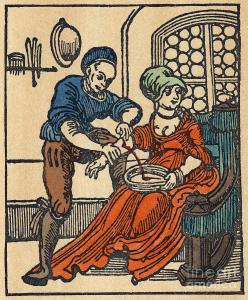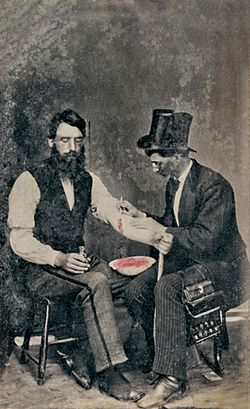Don’t forget to be thankful for modern medicine!

From An Old Merchant’s House: Life at Home in New York City, 1835-1865:
” Doctors didn’t know what caused people to be sick. What was worse, they didn’t know they didn’t know.
“It would be many years before the medical community understood the role that microscopic organisms played in causing disease and infection.
“In the meantime, various erroneous systems of belief led doctors to prescribe positively harmful treatments and medications.
“Chief among these was the ancient practice of bleeding or venesection. It was based on the notion that an overactive circulatory system caused blood to accumulate, leading to inflammation, which caused disease.The doctor used a razor-sharp lancet to cut into a vein in the arm or leg or sometimes the neck to drain blood from the circulatory system.”
How much blood are we talking about?
Charles Meigs, a leading obstetrician, wrote in 1842 that he drained 52 ounces of blood from a 20-year-old new mother who had developed childbed fever on the fourth day after delivery . Without this treatment, which Dr Meigs said was typical, he was convinced she would have died. What is amazing is that the cure didn’t kill her.

It’s hardly surprising then that many people simply became their own doctors, relying on cookbooks that included recipes for remedies or turned to alternative practitioners. among them doctors known as homeopaths. Homeopaths administered minute and extremely diluted doses of medicine to produce symptoms similar to those of the disease. This was thought to be curative.
Read more about it.
Ann Haddad, researcher at the Merchant’s House Museum, recently discovered that the family who lived in the house in the 19th century turned to homeopaths for medical treatment. It comes as a great relief to the Merchant’s House staff and volunteers. All of us who have an affection for the family who lived in the house were glad to learn that they were spared the grueling experience of bloodletting.
Read Ann’s interesting account of the history of homeopathy and how one 19th-century family embraced it.
So interesting. Just seems like such a crazy notion. I’m sure we are undergoing procedures that future generations will think are crazy…but blood letting? When did they get to transfusions? Now there is an idea that just might work!
LikeLike
I am very grateful that I have access to my lovely modern doctor and all the treatment possibilities he has at hand. However, I sometimes do wonder what people will think about our “barbaric” forms of treatment in 100 years.
LikeLike